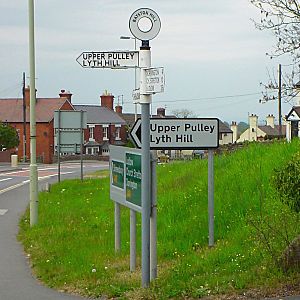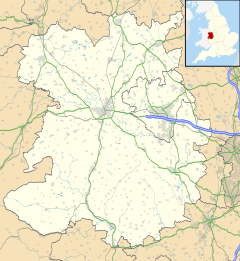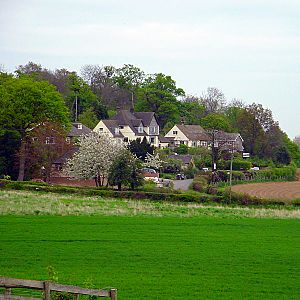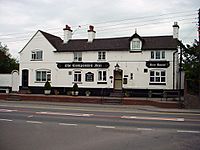Bayston Hill facts for kids
Quick facts for kids Bayston Hill |
|
|---|---|
 Bayston Hill signpost |
|
| Population | 5,079 (2011) |
| OS grid reference | SJ482086 |
| Civil parish |
|
| Unitary authority |
|
| Ceremonial county | |
| Region | |
| Country | England |
| Sovereign state | United Kingdom |
| Post town | SHREWSBURY |
| Postcode district | SY3 |
| Dialling code | 01743 |
| Police | West Mercia |
| Fire | Shropshire |
| Ambulance | West Midlands |
| EU Parliament | West Midlands |
| UK Parliament |
|
Bayston Hill is a village and civil parish in Shropshire, England. It is about 3 kilometres (2 miles) south of Shrewsbury, which is the county town. The village is located right on the main A49 road, which connects Shrewsbury to Hereford.
People have lived in Bayston Hill for a very long time, even before the Middle Ages. In 2011, the village had 5,079 residents living in 2,172 homes. Bayston Hill has three pubs, two churches (one Church of England and one Methodist), a primary school called Oakmeadow, and a public library.
Lyth Hill, a lovely natural area, is just south of the village.
Contents
History of Bayston Hill
Early History of Bayston Hill
There is proof that people lived here even in ancient times. You can find remains of an old British Iron Age hillfort (a fort built on a hill) and a Roman settlement on the higher parts of the village. During the Middle Ages, the area around Bayston Hill and Condover was a thick forest. It was used as a Royal hunting forest by kings and queens!
On the east side of the village, you can see its oldest historical site: a mounded Iron Age hillfort. It's called The Burgs, which is a Danish name, but it probably got this name much later, between the 1300s and 1500s.
Bayston Hill was even mentioned in the Domesday Book in 1086. This was a famous survey ordered by William the Conqueror to record land and property in England. Back then, the village was called Begestan. A nobleman named William Pantulf owned land there.
Important Buildings in Bayston Hill
Great Lyth manor house was built in 1638. A manor house is a large country house that was once the main residence of a lord. This one became very run-down by 1948, but it has recently been saved and fixed up.
In 1785, a London architect named George Steuart designed and built a brick mansion called Lythwood Hall. It had a grand driveway and beautiful gardens. Steuart also designed Attingham Hall, another famous building. Lythwood Hall later became old and was split into several smaller homes.
Christ Church was built in 1843, making Bayston Hill a new church area. It was created from parts of nearby parishes like St. Julian's Shrewsbury, Meole Brace, and Condover. The church was built to serve the local miners, quarry workers, and railway builders. This church area is part of the Diocese of Lichfield, which is a church district.
Modern Times in Bayston Hill
Even though the Shrewsbury and Hereford Railway (now called the Welsh Marches Line) goes right past the village, Bayston Hill has never had its own train station.
The famous romantic novelist Mary Webb lived near Bayston Hill for about ten years. She wrote her novels House in Dormer Forest and Seven for a Secret at Spring Cottage on Lyth Hill. Her most famous book, Precious Bane, takes place around the nearby Bomere Pool, which she called Sarn Mere. People say that the oldest known ghost in Shropshire, a dead Roman soldier, haunts Bomere Pool. This was once the site of a Roman army camp and a civilian settlement (a town for ordinary people).
Another link to books is found in the Brother Cadfael medieval detective novels by Ellis Peters. Many of these stories happen in the forests, lanes, and paths around Bayston Hill and the nearby medieval villages.
Bayston Hill officially became a civil parish in 1967. The original Christ Church building from 1843 is still standing. A newer church was built in the early 1980s in a more central spot for the newer houses.
In 2001, a plan to make the Bayston Hill quarry bigger was stopped. This was because a survey found six important historical sites that would have been destroyed. These included parts of Roman roads, medieval roads, old earthworks, and medieval boundary stones.
In August 2003, a part of the A5 road near Bayston Hill was closed. This happened after someone reported seeing a large black cat at a service station! Police and experts from a safari park searched for the cat, but they didn't find it.
In 2012, there were plans to change Bayston Hill from a village to a town. This would have meant having a Mayor, but residents were concerned, so the plans were dropped.
How Bayston Hill is Governed
Village Council
The village has a parish council. This council has 15 elected members who help make decisions for the village. In 2008, the council did something new: they appointed two young people, aged 14 to 18, to share the views of the village's youth at council meetings.
County Council
Bayston Hill is part of a Shropshire Council area that elects three members to Shirehall, which is where the county council meets. This area includes Bayston Hill, Column, and Sutton.
National Parliament
The village is part of the Shrewsbury and Atcham area for the UK Parliament. Julia Buckley from the Labour Party is currently the Member of Parliament (MP) for this area.
Geography of Bayston Hill
Bayston Hill sits on a rocky outcrop made of limestone and sandstone. This rock is part of a larger ancient rock formation. These rocks were formed under a huge warm ocean, surrounded by many volcanoes. Later, during the Ice Age, glaciers ground down these rocks, creating the rich soil that helped Bayston Hill become a successful farming area in medieval times.
There are still several active geological fault lines (cracks in the Earth's crust) under the area. On April 2, 1990, Bayston Hill felt an earthquake that measured 5.4 on the Richter Scale. Its centre was near Bishop's Castle.
The village is only about 5 kilometres (3 miles) south of Shrewsbury. The main A5 Trunk road separates it from the county town. Bayston Hill has good road connections, with easy access to both the A49 and A5. To the south is Lyth Hill, and to the east is Sharpstone Hill. Sharpstone Hill is now mostly a large sandstone quarry, so not much of the original hill is left after hundreds of years of quarrying.
Facilities in Bayston Hill
The village has many useful facilities. These include a Women's Institute (a group for women), the Mary Webb Library, and a large doctors' surgery called The Beeches Medical Practice. The village hall, known as Bayston Hill Memorial Hall, was built to remember local men who died fighting in World War I and World War II. Their names are listed inside the building.
There are two churches in the village. Christ Church, near Oakland School, is an evangelical Anglican church. Bayston Hill Methodist Church is on Lansdowne Road. Another church, The Storehouse, started in 2000 and meets in the Memorial Hall.
Bayston Hill has three pubs: The Three Fishes, the Compasses Inn, and The Beeches. The Beeches is in the newer part of the village, while the other two are on the older side, along the A49. Another pub called The Fox used to be on this road but was taken down in 2012 and replaced with houses.
The Village Association helps organize several popular yearly events, including a Christmas carol concert. They also give out a free monthly newsletter called the "Villager" to every home, which has information about local events and services.
Education in Bayston Hill
There isn't a secondary school in Bayston Hill. Children over the age of eleven go to secondary schools in Shrewsbury or Church Stretton.
The village used to have two primary schools: Longmeadow and Oakland Primary Schools. Because fewer students were attending, there were talks about combining the schools. In 2008, it was decided to close both schools and open a new one. After a vote, the new school was named Oakmeadow. It is a Church of England school. The older children go to the old Longmeadow site, which has been expanded to fit the whole school.
Notable People from Bayston Hill
- Violet Bland (1863–1940), a suffragette (someone who fought for women's right to vote), was born in Bayston Hill.
- Sir Harold Baxter Kittermaster (1879–1939), a colonial governor, was the son of a vicar (church leader) in Bayston Hill.
- Mary Webb (1881–1927), a famous author, lived in Spring Cottage near Bayston Hill.
- Major-General Eric Miles (1891–1977), a British Army officer who fought in both World Wars, lived on Lyth Hill.
- Flt Lt Eric Lock (1919 in Bayston Hill – 1941) was a Battle of Britain RAF air ace pilot. He was one of "The Few" brave pilots who defended Britain. Eric Lock Road in Bayston Hill is named after him.
- Christopher Timothy (born 1940), a TV and film actor, lived in the village at Lythwood Hall. He played James Herriott in the 1980s TV show All Creatures Great and Small.
Sporting Figures
- Bert Harry (1897–1966), a professional footballer who played for Crystal Palace, lived in Bayston Hill after he retired.
- Sarah Adlington (born 1986), a British judoka (judo athlete) who competed in the 2020 Olympics, grew up in Bayston Hill.
- Jake Walker (born 2000), a footballer who used to play for Aston Villa, was born in Bayston Hill.
See also
 In Spanish: Bayston Hill para niños
In Spanish: Bayston Hill para niños




